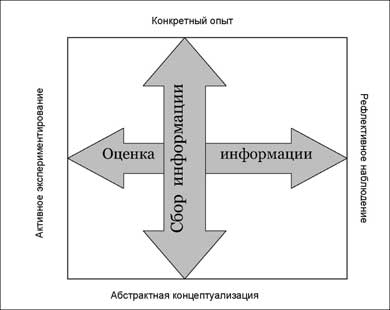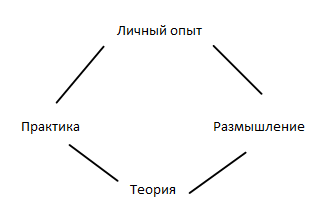David Kolb cycle in life

If you often encounter the following phrases in your work, then this article is for you:
• Why did you, without understanding, made such nonsense?
• Stop asking questions, read this little paragraph and understand everything! - I read, but did not understand, explain humanly.
• And you know, we have to do everything differently, since in book X, in chapter Y, there is a statement Z contrary to clause 14.5.3 of our TK.
• When will you start working? - I design the system, I need three more weeks.
• I have an idea how to make our life better! Vasya, listen to me, you have to do: a, b, c, d ...
so
The Kolb cycle (Kolb model) is an interesting theory on how to effectively gain knowledge. Often used in the preparation of training plans. Why? We read below.
The basis of the method is based on the assumption that the following cognitive styles can be distinguished:
• specific experience
• reflective observation,
• abstract conceptualization,
• active experimentation.
And more importantly, people tend to have a certain combination of styles for receiving and processing information. As psychologists love, on this basis one can easily divide people into groups. This, in turn, allows building training courses either highly specialized for a specific group, or covering the audience as widely as possible.
His followers Peter Honey and Alan Mumford translated these terrible names into "kitchen language" and away they went. Now any self-respecting training center, almost compulsory, declares training according to your style of knowledge.
')
Consider these styles of knowledge.

Vertically - collecting information, horizontally processing the information received. Let's try to decipher briefly:
• A bunch of personal experience and practice (adapted by the “Activist” / Kolb “Accommodation style”) is a person who likes to gain knowledge on the basis of his experience through trial and error. She loves when he is explained, shown on fingers. Usually such people do not try to study the problem deeply, but immediately run to check it in practice. Making these people understand deep theoretical works is a bad job.
• Personal experience - Blurring (Thinker / Divergent style) - a person who, like the Activist, likes to gain knowledge during communication, but is not in a hurry to test them in practice. He wants to understand to the end, mostly asking questions, or thinking, peering into the blue distance.
• Theory - Reflection (Theorist / Assimilating Style) - likes to get knowledge in a structured way, to read and deeply understand the theory. It processes knowledge independently, reflecting on its experience, chewing it repeatedly. Just as a thinker, practical activity may not be reached at all. Can be satisfied with a beautiful theory, which in principle can not be put into practice.
• Theory - Practice (Pragmatist / Convergent Style) - this is a person who loves to gain theoretical knowledge, but at the same time the applicability of knowledge in practice is important for him. He studies as much as he needs for practical tasks. And fixes the execution of tasks.
As it is manifested in school.
Try to remember your group from the university, or your last training. You can easily determine the style of knowledge by the actions of a person.
For example, did you have a person in the group who asked a lot of questions without opening a book, but with pleasure did (and maybe even demanded) practical tasks. So know, in front of you sits a pronounced activist. If he is sitting, asking questions, and even sabotaging practical tasks, then this is a thinker. He does not have to solve 15 examples in order to remember the rule (as an activist), he needs to sit down and reflex, clarify details, get more examples of compliance with what he already knows. But if a person carefully reads the theory, asks "uncomfortable" questions to the teacher, about sufficiently deep details, then this is most likely a theorist. The practitioner will demand that he be shown life examples, he does not need examples from the ceiling, let's be practical and more.
But the most interesting thing is that these conclusions can be applied further to normal daily activities.
How style manifests in life.
If you go to the store to buy a new DVD player, what do you most likely do?
1. Especially not going to worry: buy a player and go home with him. You will quickly figure out how it works. You will not have time to study the manual for it: it is too complicated written.
2. Before you buy, you will insist that the seller show you everything, and then give you the most to try. When you connect and configure the player at home, the user manual will be at your fingertips.
3. Before turning on the player, first of all you will open the instruction with the inscription “first read this” and carefully study it.
4. It will immediately become clear to you that there is much in common between this model and its predecessors. Now you focus on new features and elements, try to understand how they work, experiment with them. Later you will read the instructions to check if you did everything correctly.
1 = Activist 2 = Thinker 3 = Theorist 4 = Pragmatist
Source: Thomas, 1995
Another example. I am a terrible theorist, often I will not touch a single button before I read the instructions. But at least someone read one book on driving a car? And I already two before you get behind the wheel. And the wife, for example, is an activist, and can easily start clicking on all the buttons to understand how it works.
How this knowledge can be applied in practice
For example, if you work with an activist, it is useless to give him to read books, it is easier for him to show with an example, to give step-by-step instructions. But they are great performers who will not distract you constantly, ask a lot of unnecessary questions. When we revealed our styles at school, the majority turned out to be activists.
If you are confronted in life with a thinker, then you will recognize him by the large volumes of reasoning about how it would be good to lose weight, fly into space, start to live again, etc. But actions, except trying to persuade you to try, almost will not be. They like to philosophize more, to reason, to strain someone to realize their great ideas.
With the theorists, it will be difficult, they will get to the bottom of the essence, it is very difficult for them to tell and show something, it is easier to give literature for independent study. And when you come in a few days, he will already know even more than you. Although the result may not be, because he really liked to delve into this theory and he forgot about your task.
If you have a pragmatist in your family, then you cannot avoid suffering. These are hardworking, not very sociable people for whom practical value is most important. They, as well as theorists, find it very difficult to explain anything on their fingers, and they will also constantly torment you with the questions “why is it necessary?”. If you need to set a task or agree with such a person, you will have to prepare a report in advance on the topic “Why life is not sweet without it!”. But then he will responsibly fulfill his obligations in a short time.
Total:
Sometimes a conflict with a person can be avoided if you take into account his style of knowledge. But, what is more interesting, if you define your cognitive style with sufficient accuracy, then you will be able to significantly increase the effectiveness of your self-education.
A warning
Looking at the articles on the Internet about the Kolb cycle, there was a bad tendency - everyone comes up with their own examples / tips, perhaps not fully understanding the question, or vice versa having understood more strongly than others. Accordingly, some examples are clearly from the category of “mutually exclusive paragraphs”. But, since this is all set aside for the humanities, then everything is possible. Or maybe I still do not fully understand, so please do not take it to heart.
Useful links:
• hrm.ru/db/hrm/B7DF9E7C61B1A6D7C32575B1003F1DB2/print.html a more complete description of the Kolb cycle;
• www.mcnlp.ru/files/mmedia/text_636.pdf an interesting comparison of Kolb's theory and Pavlov's research (which was entertained with dogs);
• Test to determine your style of knowledge www.elitarium.ru/2005/12/07/opredelenie_svoego_stilja_poznanija.html
Source: https://habr.com/ru/post/159321/
All Articles